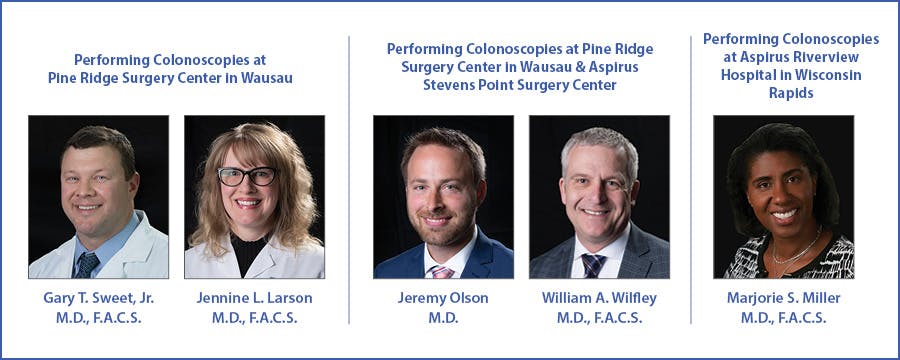
Surgical Associates performs colonoscopies at three convenient locations
The colon and rectum are both part of the large intestine and make up the final section of your digestive system. The food we eat mixes with digestive juices in the stomach, nutrients are absorbed by the walls of the small intestine and waste is then stored and evacuated from the large intestine.
Cancer occurs in the colon or rectum when cells multiply abnormally, dividing without control or order. Almost all cases begin as tiny growths, called polyps, inside the colon and typically develop into cancer slowly, usually over years.
The lifetime chance of developing colorectal cancer is 1 in 22 for men and 1 in 24 for women. And while it’s the second leading cause of death among cancers that affect both men and women, it can also be prevented entirely by catching precancerous polyps before they turn cancerous.
In fact, research shows if patients followed recommended screening guidelines, more than 60 percent of all colorectal cancers could be prevented.
Who’s at risk for colorectal cancer?
Although the exact causes of colorectal cancer are not yet determined, studies show that certain factors are linked to an increased risk.
According to the American Cancer Society, you are considered at higher risk for colorectal cancer if you have:
- A family history of colon cancer or certain types of polyps
- A personal history of colon cancer or certain types of polyps
- A personal history of inflammatory bowel disease (ulcerative colitis or Crohn’s disease)
- A family history of a hereditary colon cancer syndrome like familial adenomatous polyposis (FAP) or Lynch syndrome
- A personal history of getting radiation to the abdomen or pelvic area to treat a prior cancer
Screening
Regular screening is one of the most powerful weapons for preventing colorectal cancer. Screening tests for colorectal cancer aim to find polyps and diagnose cancer at a very early stage, when it has the best chance of being cured.
The most common form of colorectal cancer screening is a colonoscopy.
During the procedure, a highly-skilled surgeon will guide a thin, flexible camera into the colon through the rectum. The scope inflates the colon with air to give the surgeon a better view. If any polyps are found during your colonoscopy, they will be removed and sent away for testing. The surgeon will also remove any other abnormal tissue that may warrant a biopsy. For most patients, the procedure takes 30 minutes to an hour, depending on whether any polyps are removed.
Men and women at average risk should have the procedure every 10 years, beginning at age 50. If you are at greater risk, you may need to be screened at an earlier age and/or more often.
Other important ways to lower your risk of colorectal cancer include:
- Maintaining a healthy weight
- Exercising at least 30 minutes on most days
- Eating a diet rich in fruits, vegetables and whole grains
- Avoiding excess alcohol intake
- Limiting your consumption of red and processed meats
- Quitting smoking
Know the warning signs
In addition to routine screenings, it’s important to be aware of unexplained changes in your body. Early detection means cancer treatment can be less aggressive and is more likely to be successful.
According to the American Cancer Society, colorectal cancer symptoms include:
- A change in bowel habits, such as diarrhea, constipation, or narrowing of the stool, that lasts for more than a few days
- A feeling that you need to have a bowel movement that’s not relieved by having one
- Rectal bleeding with bright red blood
- Blood in the stool, which may make the stool look dark
- Cramping or abdominal (belly) pain
- Weakness and fatigue
- Unintended weight loss
Expert colorectal care. Close to home.
Call 1-888-278-3795 to schedule a colonoscopy at any of Surgical Associates’ convenient screening locations.
Meet the Specialists Performing Colonoscopies at Surgical Associates



